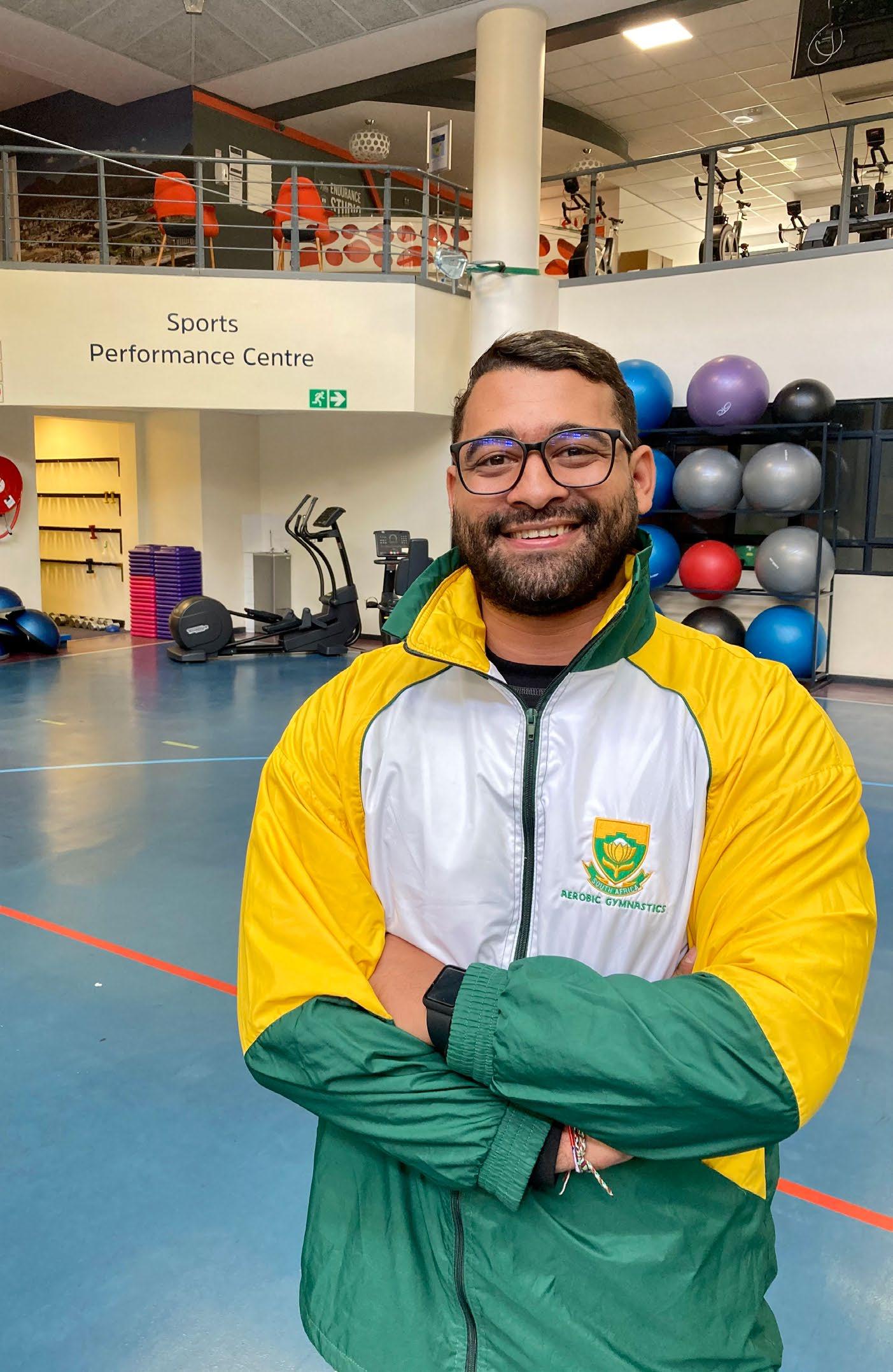
3 minute read
THE SCIENCE OF SPORT
UWC alumnus Warren Lucas becomes the first exercise scientist for Gymnastics South Africa
By Myolisi Gophe
UWC alumnus Warren Lucas was this year appointed as the exercise scientist for Gymnastics South Africa’s national teams ahead of the international tournaments such as the African Championships and World Championships. Not only is Lucas the first exercise scientist for the organisation but he is applying the knowledge he obtained through his studies to ensure the development of gymnastics in the country. And he is among countless UWC graduates who have gone on to improve society.
“As gymnastics grows and develops in South Africa, so does the need for knowledge within exercise science and sports medicine,” explains Lucas, who obtained his Bachelor of Arts (BA) in Sport and Recreation Management in 2011, his BA Honours in Sport and Recreation Management in 2012, and a Masters in Sport, Recreation and Exercise Science in 2016, all from UWC.
“We have made progress in developing a basis for knowledge within gymnastics in the past through some of my research as a Masters student at UWC, as well as through the work of Dr Denise Bouah, whose work lies in the sport psychology of high-performance athletes, and Dominic Rhodes with his work in injuries and physiotherapy of gymnasts.”
Lucas, who also chairs the Cape Town Gymnastics Association (CGTA), says they are exploring

exercise performance and body composition of gymnasts. This, he adds, is in line with the Department of Sport, Arts and Culture’s call on all sporting codes to adopt exercise, sport and medical science services to support their national squads.
Lucas, who is currently a PhD candidate in Exercise Science at the University of Cape Town (UCT), will serve for the 2021 competition cycle and his contract may be renewed after that. “I am responsible for overseeing the body composition, strength and conditioning, as well as fitness assessments of gymnasts on the High Performance Men’s and Women’s Artistic Gymnastics teams, the Senior Rope Skipping team and the Aerobic Gymnastics team,” he explains.
“As a former member of the Protea Team in Aerobic Gymnastics, I am in the position to extend assistance to current Team SA gymnasts and take the lead in the development and scientific support of gymnasts, thereby improving performance through evidence-based practices within exercise science and gymnastics for South Africa.”
Lucas can’t hide his happiness about his new appointment, either. “This has been my dream from the beginning of my studying journey within Sport Science at UWC, and this is one of the most exciting employment opportunities I’ve had to date in my career as an exercise scientist.”
And what would he like to achieve as the first exercise scientist for Gymnastics SA?
“Gymnastics is a multifaceted sport that requires a high level of physical fitness and skill to succeed,” he says. “Speed, strength, endurance, agility, flexibility, balance and power are all physical abilities that play a role in the success of a competitive gymnast. A gymnast’s physical abilities may also be related to the ability to sustain injury-free participation in the sport, and I’d like to contribute to the education and training of coaches to facilitate increased understanding and awareness of these sport science principles. Additionally, I’d like to provide workshops to gymnasts on nutrition management, life skills, personal development and career guidance.”
Lucas, who still works closely with UWC’s Interdisciplinary Centre of Sport Science and Development (ICSSD), as well as the Department of Sport, Recreation and Exercise Science, advises youth to prioritise their work by applying savvy time management practices, which should help to reduce academic workload by almost half.
“If you’re thinking of becoming an exercise scientist, sport science researcher or lecturer, sport physiotherapist, biokineticist, personal trainer, coach or fitness instructor, ensure you connect with people who are working in these capacities and ask questions about their daily duties. Try being available to shadow, volunteer and learn through experience and participation. In doing so, you will be expanding your network of people who are in these positions, which will make it much easier later to connect with industry professionals when you’re qualified.”
Having rendered his service at the African Championships for Men’s and Women’s Artistic Gymnastics in May, Lucas has been hard at work preparing teams for the Rope Skipping that took place this August as well as for the International Gymnasiade for Aerobic Gymnastics in October.










